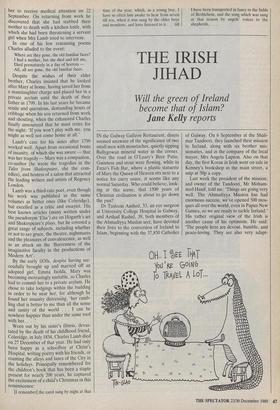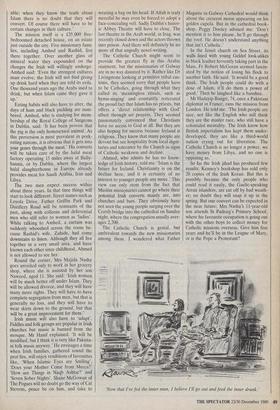THE IRISH JIHAD
Will the green of Ireland become that of Islam?
Jane Kelly reports
IN the Galway Galleon Restaurant, diners seemed unaware of the significance of two small men with moustaches, quietly sipping Ballygowan mineral water in the corner. Over the road in O'Leary's Beer Patio, Guinness and stout were flowing, while in Enzo's Fish Bar, where a plastic statuette of Mary the Queen of Heaven sits next to a notice for curry sauce, it seems like any normal Saturday. Who could believe, look- ing at this scene, that 1500 years of Christian civilisation is about to go down the pan?
Dr Tasleem Amhed, 33, an eye surgeon at University College Hospital in Galway, and Arshad Rashid, 39, both members of the Ahmadiyya Muslim sect, have devoted their lives to the conversion of Ireland to Islam, beginning with the 37,850 Catholics of Galway. On 6 September at the Shali- mar Tandoori, they launched their mission to Ireland, along with six brother mis- sionaries, and in the company of the local mayor, Mrs Angela Lupton. Also on that day, the first Koran in Irish went on sale in Kenney's bookshop in the main street, a snip at 50p a copy.
Last week the president of the mission, and owner of the Tandoori, Mr Moham- med Hanif, told me: 'Things are going very well. The Ahmadiyya Mission has had enormous success, we've opened 500 mos- ques all over the world, even in Papua New Guinea, so we are ready to tackle Ireland.' His rather original view of the Irish is another cause of his optimism. He said: `The people here are devout, humble, and peace-loving. They are also very adapt- able; when they know the truth about Islam there is no doubt that they will convert. Of course there will have to be certain changes in their culture.'
The mission itself is a £35,000 five- bedroomed detached house, on an estate just outside the city. Five missionary fami- lies, including Amhed and Rashid, live there together. Over another glass of mineral water they expounded on the changes the Irish will willingly undergo. Amhed said: 'Even the strongest cultures must evolve; the Irish will not find giving up drink hard when they are told its evils, One thousand years ago the Arabs used to drink, but when Islam came they gave it up.'
Eating habits will also have to alter, the days of ham and black pudding are num- bered. Amhed, who is studying for mem- bership of the Royal College of Surgeons in Dublin, said: 'It has been proven that the pig is the only homosexual animal. As this perversion is most prevalent in pork- eating nations, it is obvious that it gets into your genes through the meat; His converts will be taken care of by the halal meat factory operating 15 miles away at B ally- haunis, or by Dublin, where the largest halal slaughterhouse in Europe already provides meat for Saudi Arabia, Iran and Libya. The two men expect success within about three years. In that time things will start to look different. Street names such as Loyola Drive, Father Griffin Park and Distillery Road will be remnants of the past, along with colleens and deferential men who still refer to women as 'ladies'. While talking to Amhed, a curtain was suddenly whooshed across the room be- cause Rashid's wife, Zahide, had come downstairs to listen. Although they all live together in a very small area, and have known each other since childhood, Ahmed is not allowed to see her.
Round the corner, Mrs Majida Nasha goes unveiled only to work in her grocery shop, where she is assisted by her son Naweed, aged 11. She said: 'Irish women will be much better off under Islam. They will be allowed divorce, and they will have many more rights. They will have to have complete segregation from men, but that is generally no loss, and they will have to wear skirts down to the ground, but that will be a great improvement for them.' Irish music will also have to 'adapt'. Fiddles and folk groups are popular in Irish churches but music is banned from the mosque. Mr Hanif explained: 'It will be modified, but I think it is very like Pakista- ni folk music anyway.' He envisages a time when Irish families, gathered round the peat fire, will enjoy renditions of favourites like, 'When Islamic Eyes are Smiling', `Does your Mother Come from Mecca?' `How are Things in Naqb Ashtar?' and `Seven Sober Nights'. Shane McGowan of The Pogues will no doubt go the way of Cat Stevens, peace be on him, and take to wearing a bag on his head. If Allah is truly merciful he may even be forced to adopt a face-concealing veil. Sadly Dublin's histor- ic Abbey Theatre will have to close. The last theatre in the Arab world, in Iraq, was recently closed down and the actors thrown into prison. And there will definitely be no more of that ungodly novel-writing.
The Catholic Church might seem to provide the greatest fly in this Arabic ointment, but the missionaries of Galway are in no way daunted by it. Rather like Dr Livingstone looking at primitive tribal cus- toms, they seemed sorry that people have to be Catholics, going through what they called its 'meaningless rituals, such as hymn-singing' and constantly reiterated the proud fact that Islam has no priests, but offers a 'direct relationship with God' albeit through set prayers. They seemed passionately convinced that Christians have no access to God at all. But they are also hoping for success because Ireland is religious. They know that many people are devout but see hospitality from local digni- taries and tolerance by the Church as signs of Catholic weakness and decline.
Ahmed, who admits he has no know- ledge of Irish history, told me: 'Islam is the future for Ireland. Christianity is on the decline here, and it is certainly of no interest to younger people any more.' This view can only stern from the fact that Muslim missionaries cannot go where their potential Irish converts mainly are, into churches and bars. They obviously have not seen the young people surging over the Corrib bridge into the cathedral on Sunday night, where the congregation usually aver- ages 2,700.
The Catholic Church is genial, but ambivalent towards the new missionaries among them. I wondered what Father Maguire in Galway Cathedral would think about the crescent moon appearing on his golden cupola. But in the cathedral book- shop, Peggy Dooley advised me: 'Don't mention it to him please, he'll go through the roof. He doesn't understand anything that isn't Catholic.'
' In the Jesuit church on Sea Street, its walls lined with young Geldof look-alikes in black leather fervently taking part in the Mass, Fr Robert McGoran seemed fascin- ated by the notion of losing his flock to another faith. He said: 'It would be a good think. The Irish people could do with a dose of Islam, it'll do them a power of good.' Then he laughed like a banshee.
Mr Hadayip Bangri, 74, once a Pakistani diplomat in France, runs the mission from London. He told me: 'The Irish people are nice, not like the English who still think they are the master race, who still have a colonialist mentality. The Irish know how British imperialism has kept them under- developed, they are like a third-world nation crying out for liberation. The Catholic Church is no longer a power, we have money from Libya, and no one is opposing us.'
So far the Irish jihad has produced few results. Kenney's bookshop has sold only 20 copies of the Irish Koran. But this is possibly because the only people who could read it easily, the Gaelic-speaking Arran islanders, are cut off by bad weath- er; no doubt they will snap it up in the spring. But one convert can be expected in the near future; Mrs Nasha's 11-year-old son attends St Padraig's Primary School, where his favourite occupation is going out with the other boys to collect money for Catholic missions overseas. Give him five years and he'll be in the League of Mary, or is the Pope a Protestant?
`Now that I've fed the inner man, I believe I'll go out and feed the inner drunk.'











































































































 Previous page
Previous page